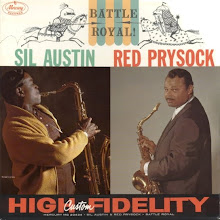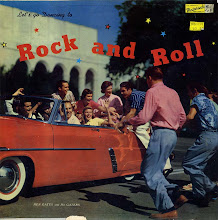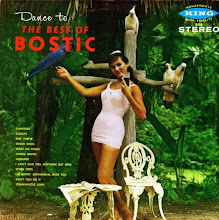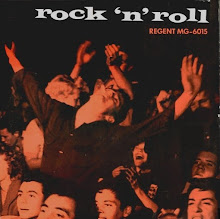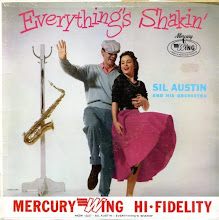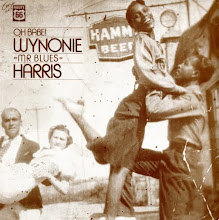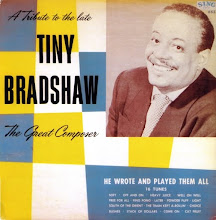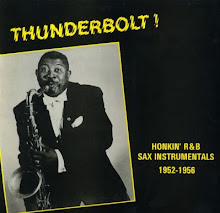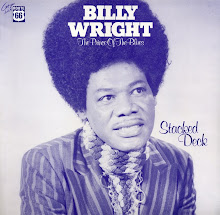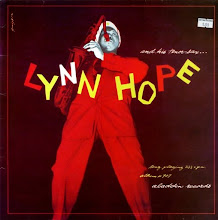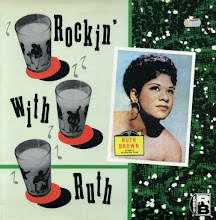Side A:
01. Woody - Leo Parker
02. Rolling With Parker - Leo Parker
03. Leo Leaps In - take 2 ** - Leo Parker
04. Solitude ** - Leo Parker
05. Rolling With Parker * - Leo Parker
06. Leo Leaps In - take 1 ** - Leo Parker
07. Leo Leaps In - take 3 ** - Leo Parker
Side B:
01. Crisco Jump ** - Sax Gill
02. Dancer's Delight - Sax Gill
03. Shortning Bread ** - Sax Gill
04. Bull Frog Bounce * - Sax Gill
05. That's The Groovy Thing * - Sax Gill
06. Mel's Jump ** - Sax Gill
07. That's The Groovy Thing * - Sax Gill
** = unreleased title
Here's a blast from the past! This compilation of sides recorded by baritone sax men Leo Parker and Sax Gill for Gotham was on the original Be Bop Wino blog about 10 years ago but with incomplete cover scans. Situation remedied for this re-up - there are new cover and label scans to go with the sound files.
Dave Penny's notes on the back cover are very thorough so there's little for me to add, except some links to other posts on Be Bop Wino where you can find more music featuring Leo Parker.
Of the two featured artists on the LP Leo Parker is by far the better known, being a major figure in the development of be bop who recorded with many of the well known musicians of the time. Originally an alto sax player, Leo shifted to baritone while with that nursery for bop, the Billy Eckstine band. He was with Eckstine from 1944 - 1946. Also in 1946 he recorded with Tadd Dameron and Sarah Vaughan for Musicraft and had a spell with Dizzy Gillespie.
1947 - 1948 was a very prolific spell for Leo who recorded for Savoy under his own name and also for various labels in groups led by Illinois Jacquet, Gene Ammons, Sir Charles Thompson, Fats Navarro, Dexter Gordon, J.J. Johnson and Russell Jacquet.
In January 1947, Leo featured on an Illinois Jacquet session for Aladdin, soloing on "Jivin' With Jack The Bellboy." You can hear that track on this LP - "Illinois Jacquet And His Tenor Sax" On the same LP Leo also solos on "For Truly" which was recorded in December 1947.
At the end of January 1947 Leo featured on a Fats Navarro Savoy session. In May and September he was with the Illinois Jacquet band for sessions on Apollo. During the summer of 1947 Leo was on a Sir Charles Thompson session for Apollo, featuring strongly on "Tunis In" and "Mad Lad." In September 1947 Leo was on a Gene Ammons Quintet session for Aladdin and on October 4th he recorded four tracks for Savoy under his own name - "El Sino," "Ineta," "Wild Leo" and "Leapin' Leo." The Savoy tracks are on this LP - "Gene Ammons - Red Top - The Savoy Sessions."
On December 11th 1947 Leo recorded three sides for Savoy with the Dexter Gordon Quintette - "Settin' The Pace," "So Easy" and "Dexter's Riff." These can be heard on the LP "Dexter Gordon Master Takes."
On December 19th 1947 Leo was with the Illinois Jacquet band for a Victor session. He solos on "Embroyo," "Mutton Leg" and "Symphony In Sid." These tracks are on the LP "King Jacquet."
In December 1947 Leo recorded sides for Savoy under his own name and also as part of a band led by J.J. Johnson. Leo was back for another Savoy session in March 1948. In May he was on a Russell Jacquet session for Sensation. You can hear two of these tracks on streaming audio on the post "Suede Jacket" / "Lion's Roar" which features two of the sides on a 78 rpm disc sent in by El Enmascarado.
You can also find these sides on the homemade compilation "Jump & Jive On 78 Volume 3."
In July 1950 Leo recorded for Prestige and in December of that year he recorded a session for Gotham as featured in this post! Only one single resulted from the Gotham session - "Woody" / "Rolling With Parker" (Gotham 262).
In July 1951 Leo recorded for Chess and in November of 1952 he cut a single for United - "Cool Leo" / "Leo's Boogie" (United 141) which you can find on the compilation LP "Screaming Saxophones Have A Ball."
Leo was back at Chess in August 1953. The effects of a long standing heroin addiction were badly affecting his career and his next session was not until July 1954 when he cut an LP with guitarist Bill Jennings for King - "Billy In The Lion's Den." In December of that year he recorded with Illinois Jacquet for Clef and then ill health took over, stopping his recording activity for nearly seven years.
In September and October of 1961 he had an all too brief comeback with Blue Note - recording two albums - "Let Me Tell You 'Bout It" and "Rollin' With Leo." The latter album was not released until 1980. He was scheduled to record a Blue Note LP with Dexter Gordon in early 1962 but in February of that year he died of a heart attack.
1947 - 1948 was a very prolific spell for Leo who recorded for Savoy under his own name and also for various labels in groups led by Illinois Jacquet, Gene Ammons, Sir Charles Thompson, Fats Navarro, Dexter Gordon, J.J. Johnson and Russell Jacquet.
In January 1947, Leo featured on an Illinois Jacquet session for Aladdin, soloing on "Jivin' With Jack The Bellboy." You can hear that track on this LP - "Illinois Jacquet And His Tenor Sax" On the same LP Leo also solos on "For Truly" which was recorded in December 1947.
On December 11th 1947 Leo recorded three sides for Savoy with the Dexter Gordon Quintette - "Settin' The Pace," "So Easy" and "Dexter's Riff." These can be heard on the LP "Dexter Gordon Master Takes."
On December 19th 1947 Leo was with the Illinois Jacquet band for a Victor session. He solos on "Embroyo," "Mutton Leg" and "Symphony In Sid." These tracks are on the LP "King Jacquet."
In December 1947 Leo recorded sides for Savoy under his own name and also as part of a band led by J.J. Johnson. Leo was back for another Savoy session in March 1948. In May he was on a Russell Jacquet session for Sensation. You can hear two of these tracks on streaming audio on the post "Suede Jacket" / "Lion's Roar" which features two of the sides on a 78 rpm disc sent in by El Enmascarado.
You can also find these sides on the homemade compilation "Jump & Jive On 78 Volume 3."
In July 1950 Leo recorded for Prestige and in December of that year he recorded a session for Gotham as featured in this post! Only one single resulted from the Gotham session - "Woody" / "Rolling With Parker" (Gotham 262).
In July 1951 Leo recorded for Chess and in November of 1952 he cut a single for United - "Cool Leo" / "Leo's Boogie" (United 141) which you can find on the compilation LP "Screaming Saxophones Have A Ball."
Leo was back at Chess in August 1953. The effects of a long standing heroin addiction were badly affecting his career and his next session was not until July 1954 when he cut an LP with guitarist Bill Jennings for King - "Billy In The Lion's Den." In December of that year he recorded with Illinois Jacquet for Clef and then ill health took over, stopping his recording activity for nearly seven years.
In September and October of 1961 he had an all too brief comeback with Blue Note - recording two albums - "Let Me Tell You 'Bout It" and "Rollin' With Leo." The latter album was not released until 1980. He was scheduled to record a Blue Note LP with Dexter Gordon in early 1962 but in February of that year he died of a heart attack.
Sax Gill had three singles released on Gotham, but of the six sides, only one is on this LP in its original release take - "Dancer's Delight." The singles were -
"Drigo's Serenade" / "Bull Frog Bounce" (Gotham 192), released in September 1949.
"Snaperoo" / "Rhythm Fantasy" (Gotham 205), released in November 1949.
"Dancer's Delight" / "That's The Groovy Thing" (Gotham 217), released in January 1950.
For the Melvin "Sax" Gill story, read Dave Penny's notes on the cover of this LP.
If you follow all the links above you are now in a position to make up your own Leo Parker compilation. Have fun!
Leo Parker discographical information from JazzArcheology.com:
http://www.jazzarcheology.com/leo-parker/








































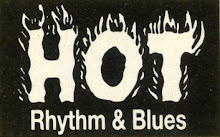
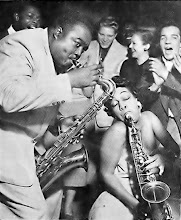




.jpg)




%2045%20-%201012A.png)














